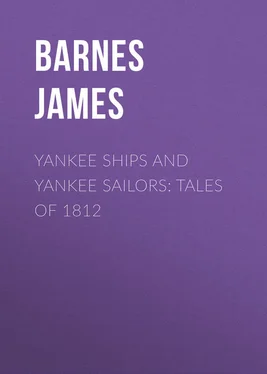James Barnes - Yankee Ships and Yankee Sailors - Tales of 1812
Здесь есть возможность читать онлайн «James Barnes - Yankee Ships and Yankee Sailors - Tales of 1812» — ознакомительный отрывок электронной книги совершенно бесплатно, а после прочтения отрывка купить полную версию. В некоторых случаях можно слушать аудио, скачать через торрент в формате fb2 и присутствует краткое содержание. Жанр: foreign_antique, foreign_prose, foreign_children, на английском языке. Описание произведения, (предисловие) а так же отзывы посетителей доступны на портале библиотеки ЛибКат.
- Название:Yankee Ships and Yankee Sailors: Tales of 1812
- Автор:
- Жанр:
- Год:неизвестен
- ISBN:нет данных
- Рейтинг книги:5 / 5. Голосов: 1
-
Избранное:Добавить в избранное
- Отзывы:
-
Ваша оценка:
- 100
- 1
- 2
- 3
- 4
- 5
Yankee Ships and Yankee Sailors: Tales of 1812: краткое содержание, описание и аннотация
Предлагаем к чтению аннотацию, описание, краткое содержание или предисловие (зависит от того, что написал сам автор книги «Yankee Ships and Yankee Sailors: Tales of 1812»). Если вы не нашли необходимую информацию о книге — напишите в комментариях, мы постараемся отыскать её.
Yankee Ships and Yankee Sailors: Tales of 1812 — читать онлайн ознакомительный отрывок
Ниже представлен текст книги, разбитый по страницам. Система сохранения места последней прочитанной страницы, позволяет с удобством читать онлайн бесплатно книгу «Yankee Ships and Yankee Sailors: Tales of 1812», без необходимости каждый раз заново искать на чём Вы остановились. Поставьте закладку, и сможете в любой момент перейти на страницу, на которой закончили чтение.
Интервал:
Закладка:
James Barnes
Yankee Ships and Yankee Sailors: Tales of 1812
PREFACE
In presenting this volume of "Tales of 1812" it is not the intention of the author to give detailed accounts of actions at sea or to present biographical sketches of well-known heroes; he wishes but to tell something of the ships that fought the battles, whose names are inseparably connected with a glorious past, and to relate incidents connected with the Yankee sailors who composed their crews – "A Yankee Ship and a Yankee Crew" – thus runs the old song; it is to exploit both in a measure that is the intention of this book. Brave fellows, these old-time Jackies were. Their day has gone by with the departed day also, of the storm-along captains, the men who carried sail in all sorts of weather, who took their vessels through dangerous passages unmarked by buoys, with only the fickle wind to drive them, who sailed into the enemy's cruising-grounds, and counting on the good Yankee pine and live oak, had perilous escapes and adventures which fiction cannot exaggerate. It stirs one's blood to read of these. Surely, it will not arouse a hatred for by-gone enemies, to hark back to them.
The incidents made use of in the following pages are historical, or at least authentic – some may perhaps come under the head of tradition. Tradition is historical rumor; it may be proved by investigation to be actual fact, or it may be accepted at its face value, on account of its probability. To investigate, one is led to break open and dissect and sometimes we destroy a wealth of sentiment in the proceeding; by casting aside tradition that is harmless we destroy the color of history; we may lose its side lights and shadows that give vividness and beauty to the whole effect. It has not been a spirit of research into the science of history, or a chance for deep delving into figures and records, that has animated the author, although he has drawn upon state papers for material, and all correspondence and important references can be vouched for. He has endeavored to refreshen the colors by removing the dust that may have settled. He has touched the fragile bric-a-brac of tradition with the feather duster of investigation. There is sufficient excuse for everything that is written in this book. Facts are not lacking to prove much here to be true. It will not confuse our historical knowledge to accept it thus.
We can draw accurate conclusions as to what kind of men these fine old fellows were; how they looked; how they spoke and acted. Their deeds are part of the nation's record, and their ships exist now in the shape of a few old hulls. We can mark how carefully and strongly they were constructed; we can imagine them swarming with men and quivering beneath the thunder of broadsides. The author has tried to put the sailor back upon his ship again. Here we have the old tales now retold; retold by one who loves to listen to them, therefore to talk about them. This is his prologue to the telling, and that is all there is to it.
ALLEN, OF THE CHESAPEAKE
Give a ship an unlucky name, and it will last throughout the whole of her career. A sailor is proverbially superstitious, and he clings jealously to tradition.
It is told that when the frigate Chesapeake was launched she stuck fast on the ways, and did not reach the water until the following day, which was Friday. Although she was a fine vessel to look at, she grounded upon the bar upon her first attempt to sail, and, when once free, behaved herself in such a lubberly fashion that those who witnessed her starting out declared she was bewitched. Even after many changes had been made in the length of her masts, in the weight of spars, and the cut of sails, still she was considered by many a failure. And, although her sailing qualities improved as time went on, yet her bad name stuck to her, as bad names will.
Given this drawback, the unlucky captain of such a craft finds it difficult to recruit a proper crew, and must often be content with green hands, or the riffraff disdained by other ships' masters.
Commodore James Barron, who had been ordered to the Chesapeake , was a brave officer. He had succeeded the peppery Commodore Preble in command of the fleet that had so successfully negotiated the operations before Tripoli, and there he had won for himself a name and reputation. Nevertheless, he was not entirely popular with his officers. They failed to find in him the graciousness of manner and deportment, the strict adherence to the lines of duty, and yet the kindliness of thought and conduct that distinguished young Captain Bainbridge; and they missed, strange to say, the iron hand and stern rule of Preble, the martinet.
Just before sailing from the Capes to relieve the Constitution on the Mediterranean station, the Chesapeake had recruited, from Delaware and Maryland, a green crew. Not above fifty of her complement were men-of-warsmen. Perhaps one hundred more had seen service in deep-sea craft, and had made long cruises; but the rest, numbering probably one hundred and fifty, were longshoremen or landsmen. Lying inside the mouth of Chesapeake Bay were several British men-of-war. As was usual when in American ports, they were compelled to watch their crews most closely, for the higher pay and the better treatment, which cannot be denied, had tempted many an impressed seaman to leave his ship, and take refuge under the American flag.
It was claimed by Vice-Admiral Berkeley in command of the English fleet, that four British sailors had deserted from the Melampus , and joined Barron's frigate. The following correspondence passed between Robert Smith, the Secretary of the Navy at Washington, and Commodore Barron, in relation to the matter. It explains in the best way possible, how affairs stood at the outset.
Washington, April 6, 1807.
To Commodore James Barron : —
Sir: It has been represented to me that William Ware, Daniel Martin, John Strachan, John Little, and others, deserters from a British ship of war at Norfolk, have been entered by the recruiting officer at that place for our service. You will be pleased to make full inquiry relative to these men (especially, if they are American citizens), and inform me of the result. You will immediately direct the recruiting officer in no case to enter deserters from British ships of war.
Robt. Smith.
To this letter Commodore Barron made haste to reply, and the following is taken verbatim from his note to the Secretary: —
"William Ware was pressed from on board the brig Neptune , Captain Crafts, by the British frigate, Melampus , in the Bay of Biscay (in 1805)… He is a native American, born at Bruce's Mills, on Pipe Creek, in the county of Frederick, Maryland, and served his time at said mills. He also lived at Ellicot's Mills, near Baltimore, and drove a waggon several years between Hagerstown and Baltimore. He also served eighteen months on board the U.S. frigate, Chesapeake , under the command of Captain Morris and Captain J. Barron. He is an Indian-looking man.
"Daniel Martin was impressed at the same time and place; a native of Westport, in Massachusetts, about thirty miles to the eastward of Newport, Rhode Island; served his time out of New York with Captain Marrowby of the Caledonia ; refers to Mr. Benjamin Davis, merchant, and Mr. Benjamin Corse, of Westport. He is a colored man.
"John Strachan, born in Queen Ann's County, Maryland, between Centreville and Queenstown; sailed in the brigantine Martha Bland , Captain Wyvill, from Norfolk to Dublin, and from thence to Liverpool. He then left the vessel and shipped on board an English Guineaman; he was impressed on board the Melampus , off Cape Finisterre; to better his condition he consented to enter, being determined to make his escape when opportunity offered; he served on board said frigate two years; refers to Mr. John Price and – Pratt, Esq., on Kent Island, who know his relatives. He is a white man, about five feet seven inches high.
Читать дальшеИнтервал:
Закладка:
Похожие книги на «Yankee Ships and Yankee Sailors: Tales of 1812»
Представляем Вашему вниманию похожие книги на «Yankee Ships and Yankee Sailors: Tales of 1812» списком для выбора. Мы отобрали схожую по названию и смыслу литературу в надежде предоставить читателям больше вариантов отыскать новые, интересные, ещё непрочитанные произведения.
Обсуждение, отзывы о книге «Yankee Ships and Yankee Sailors: Tales of 1812» и просто собственные мнения читателей. Оставьте ваши комментарии, напишите, что Вы думаете о произведении, его смысле или главных героях. Укажите что конкретно понравилось, а что нет, и почему Вы так считаете.












